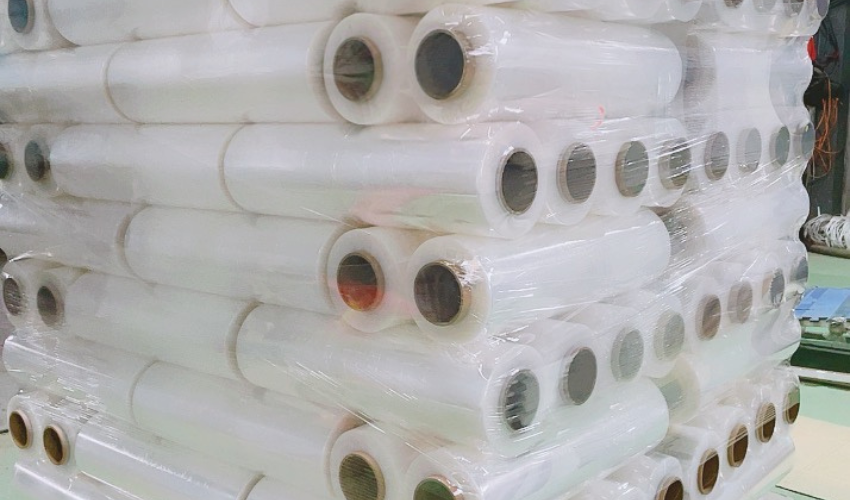
Plastic wraps are an essential tool across various industries, offering versatility and efficiency in packaging and protection. White plastic wrap is commonly used for preserving food freshness and is also popular in industrial packaging and transportation. Its opaque finish provides privacy, UV resistance, and tamper-evident security. Shipping plastic wrap, in particular, is designed to secure items during transit, offering additional durability and protection. For other applications, black plastic wrap is also utilized, particularly when a more discreet appearance is needed, or to provide additional protection from light during storage and transport. Whether you are bundling products for shipping or wrapping pallets for storage, plastic wrap ensures durability and superior protection. With its ability to meet diverse needs, this material has become a cornerstone in modern packaging, offering both functionality and visual appeal.
White plastic wrap is a versatile packaging solution that offers numerous advantages, making it a top choice for both personal and industrial applications. Here are the key benefits that set it apart:
One of the most significant advantages of white plastic wrap is its ability to shield products from environmental factors. Its strong material acts as a barrier against moisture, dust, and UV light, ensuring items remain intact and in excellent condition during storage or transportation. This feature is particularly valuable for goods that need long-term protection or exposure to outdoor conditions. When used alongside bundling stretch film, it becomes even more effective, allowing items to be secured tightly while adding an extra layer of defense against external elements.
The clean, opaque finish of white plastic wrap enhances the presentation of packaged items. This sleek appearance is especially important for products where visual appeal matters, such as retail goods or branded shipments. Its white color also conveys professionalism and ensures that wrapped contents are not visible, providing an added layer of privacy.
Tamper-evident packaging is crucial for industries that require product integrity, such as food, pharmaceuticals, and electronics. White plastic wrap offers this essential feature by making it clear if a package has been opened or altered during transit. This builds trust with customers and ensures that items arrive at their destination in their original state.
White plastic wrap comes in various forms, each designed to meet specific packaging and protection needs. Understanding the differences among these types can help you select the best option for your requirements.
White plastic shrink wrap is a popular choice for securing items tightly. When heat is applied, this wrap contracts around the object, creating a snug and durable seal.
For businesses requiring flexibility, white plastic film roll is a versatile solution. These large rolls provide continuous material for custom wrapping and packaging.
For quick and efficient pallet wrapping, 4 x 8 white shrink wrap pallet bags are a go-to option.
A comparison of orange pallet wrap and white plastic wrap reveals their distinct advantages:
| Feature | Orange Wrap | White Plastic Wrap |
|---|---|---|
| Visibility | Highly visible, used for color-coding | Opaque, ensuring privacy of contents |
| UV Protection | Limited UV resistance | Excellent UV protection for outdoor use |
| Appearance | Bright, attention-grabbing colors | Clean, professional, and aesthetic look |
| Preferred Applications | Identification and sorting of shipments | Securing high-value or confidential items |
The choice between white plastic wrap and other types depends on your specific needs, with each offering unique advantages for packaging and protection.
White plastic wrap is highly adaptable, with custom pallet options designed to cater to diverse packaging requirements. These tailored solutions offer businesses the flexibility to enhance packaging efficiency, branding, and product protection.
Custom solutions for white plastic wrap address unique packaging needs by providing options tailored to specific products and industries.
Partnering with reliable suppliers is crucial to achieving cost-effective and high-quality packaging solutions.
The production process behind white plastic wrap is a fascinating glimpse into advanced manufacturing technology.
By leveraging the benefits of custom pallet white plastic wrap, businesses can optimize their packaging strategies, enhance brand recognition, and ensure product safety at every stage of the supply chain.
White plastic wrap comes in various forms, and one of the most specialized versions is the white opaque stretch film. This film offers unique features and applications that make it an essential solution for businesses needing secure, discreet, and durable packaging.
White opaque stretch film is widely used across various industries due to its strong protective properties and versatility.
Plastic wrap is known by several names depending on its use and region. The most common names include cling film, saran wrap, food wrap, and plastic film. These terms are used interchangeably to refer to a thin, flexible plastic film that is primarily used for sealing food items and other products to preserve their freshness or protect them from dust, moisture, and contaminants. Saran wrap is a brand name that became so popular it is often used as a general term for plastic wrap. The material is typically made from polyethylene or polyvinylidene chloride (PVDC), both of which are durable, flexible, and capable of adhering tightly to surfaces. In addition to its widespread use in food storage, plastic wrap is also used in packaging, shipping, and industrial applications. The adhesive nature of plastic wrap makes it perfect for creating tight seals around objects, ensuring protection and freshness.
While cling wrap and plastic wrap are often used interchangeably, there is a subtle difference between the two. Cling wrap refers specifically to plastic film that has a high level of adhesiveness, allowing it to cling or stick to surfaces, especially when wrapped around food. This stickiness makes it an excellent choice for securing food items and creating an airtight seal to keep them fresh. On the other hand, plastic wrap is a broader term that refers to any thin, flexible plastic film used for wrapping or covering items. While all cling wraps are plastic wraps, not all plastic wraps are cling wraps. Some plastic wraps may not have as much adhesive strength and are used primarily for protecting items from dust, moisture, or environmental factors rather than providing an airtight seal. In short, cling wrap is a specific type of plastic wrap designed to cling to surfaces, while plastic wrap can include a range of films with different adhesive properties.
Plastic wrap and cellophane are both transparent films used for packaging, but they are made from different materials and have distinct characteristics. Plastic wrap, often made from polyethylene or PVC (polyvinyl chloride), is a synthetic polymer that is highly flexible, moisture-resistant, and adheres well to surfaces, making it ideal for food preservation and packaging. It is also commonly used in industrial and retail packaging. Cellophane, on the other hand, is a biodegradable film made from regenerated cellulose. Unlike plastic wrap, it is not inherently sticky and usually requires an adhesive or heat sealing to adhere to items. Cellophane is also less flexible than plastic wrap and is more prone to tearing. While plastic wrap is more commonly used in everyday applications like food storage, cellophane is often used for gift wrapping, candy packaging, and some high-end food products. Cellophane’s eco-friendly properties give it an edge for certain environmentally conscious consumers.
As concerns about the environmental impact of plastic wrap continue to grow, many consumers are turning to alternatives that are more eco-friendly and sustainable. Some of the best alternatives to plastic wrap include beeswax wraps, silicone food storage bags, reusable food storage containers, and glass jars.
Beeswax wraps are one of the most popular alternatives. Made from organic cotton infused with beeswax, resin, and jojoba oil, these wraps are reusable, washable, and can be molded to seal food items, providing an airtight and breathable solution.
Silicone food storage bags offer a durable, reusable alternative to single-use plastic wrap. These bags are flexible, leakproof, and can be used to store food items safely in the fridge or freezer.
Reusable food storage containers are another great option, offering a more sustainable method of storing food. These containers come in various materials, such as glass, stainless steel, or BPA-free plastic, and can be sealed tightly for freshness without the need for plastic wrap.
Glass jars with airtight lids are ideal for storing small amounts of food, such as dry goods, leftovers, or snacks, providing a plastic-free option for preserving food.
These alternatives not only reduce plastic waste but also provide long-term, cost-effective solutions for food storage.

My name is James Thompson, and I’m the editor of this website dedicated to Stretch Film, Pallet Wrap, and Stretch Wrap products.
My passion for packaging began when I noticed the challenges companies face in securing their products efficiently for transportation and storage. This inspired me to delve deep into the world of stretch films and pallet wraps, exploring the latest technologies and best practices.
I aim to provide valuable insights, practical tips, and up-to-date industry trends to assist you in making informed decisions. Whether you’re a small business owner or part of a large corporation, my goal is to support you in optimizing your operations and ensuring your products reach their destination safely.
Thank you for visiting, and I look forward to accompanying you on your journey toward better packaging solutions.
Comments are closed